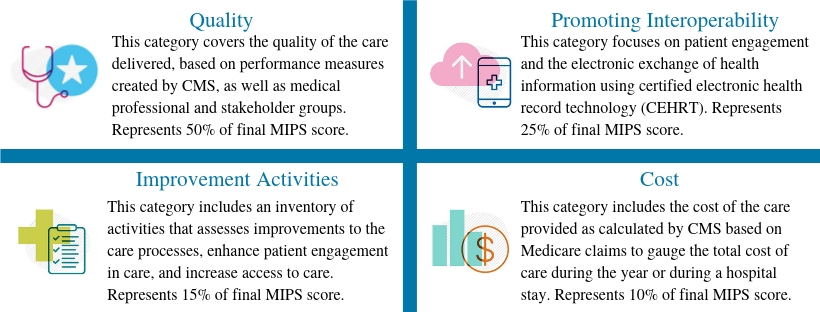Monitor Regulatory Implementation of MACRAIn 2016, the Centers for Medicare and Medicaid Services (CMS) passed the Medicare Access & CHIP Reauthorization Act (MACRA) to replace the Medicare Part B Sustainable Growth Rate (SGR). The new value-based reimbursement model, the Quality Payment Program (QPP), started on January 1, 2017 and was intended to reward value and performance provided by clinicians. The program’s goal is to ultimately to promote better accessibility, quality, affordability, empowerment, and innovation across US healthcare. The QPP evaluates and rewards physicians through either the Merit-based Incentive Payment System (MIPS) or Advanced Alternative Payment Models (APMs). Under MIPS, clinician performance and scoring are based on four essential categories: quality, promoting interoperability, improvement activities, and cost.
Based on their MIPS scores, physicians will see anywhere from +/-4% adjustment to their Medicare reimbursement in year 1 to +/-9& in year 4, with a potential 3X multiplier for exceptional performances. Advanced APMs are for physicians who have at least 20% of eligible Medicare patients or 25% of their Medicare Part B payments through a qualified APM. Although choices are limited, CMS encourages participation in APMs. WHAT IS LUGPA’S GOAL?With the majority of a practice’s MIPS score driven by quality measures, choosing the most accurate measures is essential. In particular, electronic Clinical Quality Measures (eCQMs), or clinical quality measures intended to use data from electronic health records (EHR) or health information technology systems, can be especially useful for independent practices. LUGPA is leading the effort to develop urology-specific electronic Clinical Quality Measures (eCQMs). LUGPA is working with CMS to approve more APMs in which our practices can participate. For LUGPA member practices to benefit from an APM, providers need integrated clinical and financial systems that can monitor treatment pathway adherence, quality metrics, practice costs and patient outcomes. This is why LUGPA is working to develop the first urology-specific Advanced APMs. Urologists need APMs developed and validated by urologists – not imposed upon them – to bolster independent practices and enhance value-based care for patients. LUGPA’S ACTIONS AND RESOURCESCongress Considers Proposal to Mitigate Medicare Physician Payment Cuts (December 2023) LUGPA Submits Comments to Congress on MACRA and Physician Payment Reform - October, 2022 PTAC Meeting, LUGPA Part 1 - YouTube- U.S. Department of Health and Human Services · Jan 2, 2018 LUGPA Advanced Payment Model (APM) for Initial Therapy of Newly Diagnosed Patients with Organ-Confined Prostate Cancer - Jul 5, 2017 Letter of Intent – LUGPA APM for Initial Therapy of Newly Diagnosed Patients with Organ-Confined Prostate Cancer – April 14, 2017 |





